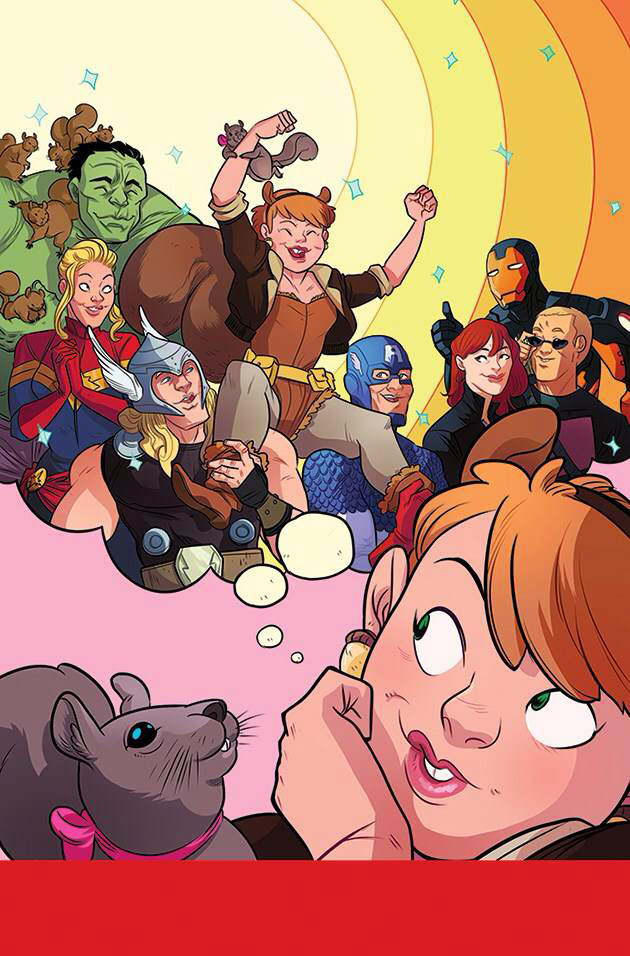Comics see progressive trend in including more female writers, characters

“The Unbeatable Squirrel Girl” is the first edition of the Squirrel Girl franchise that centers around its title character. (Courtesy of Ryan North and Erica Henderson)
By Joshua Greenberg
Jan. 21, 2015 12:05 a.m.
Comic books are everywhere – Marvel and DC Comics are mining decades of story lines for a huge slate of movies and television shows. But comics are more than a source to be mined for superhero blockbusters. New creators are dealing with issues every month in ways that couldn’t be done in other formats – issues of comic books.
Comics should be for everyone.
Men have long been the main readers of comic books. But in the last decade, publishers and fans began to learn the value of not ignoring half of their potential marketplace. Women writers and illustrators are claiming their rightful place, while pushing back established gender norms.
“Ms. Marvel,” written by G. Wilson and illustrated by Adrian Alphona and Jake Wyatt, was in the news last year for its groundbreaking portrayal of a Pakistani Muslim superhero fangirl in New Jersey, dealing with sudden shapeshifting. Since, “Ms. Marvel” has become an incredibly solid, fun superhero comic. While full sales are not released, “Ms. Marvel” is selling better digitally than in print – and it’s doing very well in print for a year-old series.
Just this month saw the release of the first issue of Marvel’s “The Unbeatable Squirrel Girl” by “Dinosaur Comics” writer Ryan North and artist Erica Henderson. This one’s about an unstoppable, but little-known character, with squirrel powers who regularly takes on Doctor Doom and Galactus and wins. Canonically, it’s perfectly suited for Henderson’s bright art, decidedly not in Marvel’s standard house or typical “superhero comic art” style.
Sales aren’t everything, but it’s important to see that these new mainstream series written by and featuring women are hits among all audiences. While it’s part of a broader trend of revitalization, the role of fans can’t be understated. These are characters that people are passionate about.
The general attitude toward misogynistic patterns in comics is changing. There was huge outcry on social media over Milo Manara’s butt-centric variant cover to “Spider-Woman,” which eventually got pulled because of the backlash. It’s no longer acceptable to have openly sexist art on the front of store shelves. Fans have responded by posing male superheroes in the same improbable poses that female ones often have.
Beyond the superhero set, female writers bring new perspectives and challenges – telling the stories that only they can tell. There are angles generally unexplored that are now finding their way to the light. Mariko and Jillian Tamaki’s “This One Summer” is a graphic novel about two teens growing up on a summer beach trip. It’s a slow, quiet book about the friendship and families these two girls have.
I read Emily Carroll’s horror anthology “Through the Woods” on the first night of move-in week, when the dorms were empty and silent. That vulnerability, aloneness – and the fear it creates – is at the heart of Carroll’s work. It creeped me out so much I couldn’t get back to sleep. Her protagonists are swept up into forces they can only run and hide from, in stories inspired by The Brothers Grimm and gothic legends. Many of her comics are on her website, though “Through the Woods” adds new stories.
There are things I didn’t expect. I enjoyed “Lumberjanes,” a new adventure comic about a girls’ summer camp, but while reading it, I got the sense that it wasn’t written with me in mind. That’s the first time in a while that that has happened. I’m white, male and between the ages of 18 and 25. I like explosions and complicated continuities. I am usually the first target audience for this sort of thing.
And that’s a good thing. In fact, that’s great for comic books as a whole. I don’t want to be pandered to all the time, because my tastes are not everyone’s tastes. If it felt slightly off to me that “Lumberjanes” featured a cast without any men on it, I can imagine how it would feel to have all-male and mostly male casts shrugged off as a normal baseline. It’s a sign of a vibrant and thriving industry that there are books on the shelves that appeal to many different audiences.
I’d like to see a future that’s completely equitable toward women in comics. The world isn’t there yet, or even close, but there’s been a good deal of progress forward.
What female-driven comics have you read lately? Email Greenberg at [email protected]


